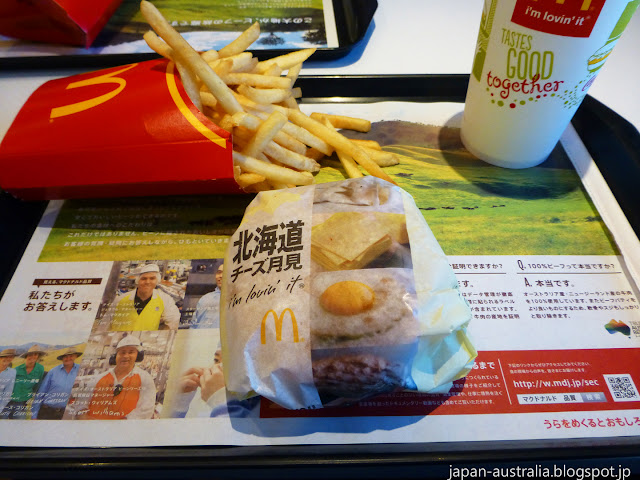Autumn is considered a time in Japan to enjoy delicious season food, cooler weather after the summer heat, and koyo (紅葉) which is viewing of the colourful Autumn leaves. The Tsukimi Burger It is only available for a limited time during the early Autumn and made its appearance back on the menu again in early September. It will remain on the menu until early October.
The Tsukimi Burger has been around for a few years now, making its first appearance way back in 1991. It has been a popular seasonal favourite ever since and always comes back in some form or the other every year. It traditionally contains a beef patty, smoky bacon, a poached egg and a special sauce (ketchup mixed with Japanese mayonnaise).
The Tsukimi Burger (月見バーガー) is named after the famous Japanese tradition of tsukimi (月見) or moon viewing, which is a festival honouring the bright Autumn moon. The poached egg in the burger is said to resemble the Autumn full moon with the egg yolk representing the bright Autumn full moon and the egg white the white sky.
In 2013 McDonald’s released a new addition to the Tsukimi line-up with the Chicken Cheese Tsukimi Burger. In 2014 it was the Kinoko Tsukimi Burger featuring mushrooms. What will it be in 2015?
This year in 2015 they have released two new Hokkaido cheese versions of the Tsukimi Burger to go along with the original Tsukimi Burger. The new additions are the Hokkaido Cheese Tsukimi Burger and the Chicken Tsukimi Hokkaido Cheese Burger.
Tsukimi Burger
The original and some say best version of the burger contains a beef patty, smoky bacon, a poached egg and special sauce.
 |
| Original Tsukimi Burger |
Hokkaido Cheese Tsukimi Burger
The Hokkaido Cheese Tsukimi is the same as the original Tsukimi Burger with the addition of Hokkaido cheddar cheese.
 |
| Hokkaido Cheese Tsukimi Burger |
Chicken Tsukimi Hokkaido Cheese Burger
The Chicken Tsukimi Hokkaido Cheese features a crispy chicken patty along with smoky bacon, Hokkaido cheddar cheese and special sauce.
 |
| Chicken Tsukimi Hokkaido Cheese Burger |
The Tsukimi Burger has long been a favourite of ours at Japan Australia, so we had to head over the our nearest McDonald’s to test out the new Hokkaido Cheese Tsukimi Burger.
The Taste Test
The new Hokkaido Cheese Tsukimi Burger certainly didn’t disappoint and we really liked the addition of the Hokkaido cheddar cheese which was really creamy. Eating the burger was like being reacquainted with a long lost friend. Ah, Autumn is finally back in Japan and this cooler weather is just another sign that the long hot summer in Japan is finally over for another year.
 |
| Hokkaido Cheese Tsukimi Burger Set |
 |
| The simple wrapping of the Hokkaido Cheese Tsukimi Burger |
 |
| The Hokkaido Cheese Tsukimi Burger Unwrapped |
Prices for the burgers vary depending on the region of Japan. The Tsukimi Burgers are only available for a limited time, so hurry on in if you want to give them a try.
McDonald’s Japan Website













